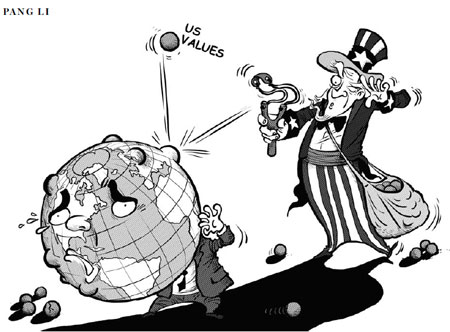Defense spending the target
Updated: 2012-04-09 08:02
By Luo Yuan (China Daily)
|
||||||||

Most countries have a military budget, China's is neither the largest nor the fastest growing compared with other nations
Each year when China's top legislature and advisory body meet for their annual sessions in Beijing and announce the country's military budget, the Western media are guaranteed to peddle stories about the "China threat" with scare mongering headlines.
They know only too well, of course, that most countries in the world have a military budget, and the China's is neither the largest nor the fastest growing. In terms of size, the US military budget for 2012-2013 is $662 billion, compared to China's $106 billion. In terms of growth, India's budget for 2012-2013 is 17 per cent more than the previous one, while China will see a rise of merely 11.2 per cent. Why does no one point a finger at the United States or India as a military threat?
Every cent that is spent on the Chinese military is to safeguard its citizens and its territory and help maintain peace.
Last year, China spent $75 to protect each of its citizens, and $9.72 to protect each square kilometer of its land. The US on the other hand spent $2,201 to protect each of its citizens and $75.3 to protect each square kilometer of its territory. It is not difficult to see which country is the real threat.
Some have alleged that China's military budget has outgrown its demand for self-defense, but it should be pointed out that China has never staged any military exercises off the coast of another country or carried out any close reconnaissance of another country. And it is worth remembering that China has never seized a single inch of another country or region's territory. On the contrary, others are occupying its reefs and isles and plundering its resources. China is justified in spending money on its military to keep its territory intact.
Meanwhile, the international community has been urging China to shoulder greater global responsibilities, which means it needs sufficient military spending to meet these obligations. Also military salaries need to keep in line with inflation and the disaster relief capabilities of the army must be strengthened continuously.
Unfortunately, no matter how open China makes its military spending, there are always some who claim it is hiding something, no matter how hard it tries to keep its military budget transparent.
In the previous fiscal year, China's military spending was $96.5 billion. Yet in its appraisal of China's military strength, the United States put the figure at $160 billion. Some Western think tanks have also alleged that China's military spending has increased by more than 18.6 percent every year during the past decade. However, during that period, only in 2009 did China's military spending rise by more than 18 percent.
In fact, China joined the UN Standardized Instrument for Reporting Military Expenditures in 2007, and has remained a law-abiding member, as evidenced by its annual breakdown of its military spending to the UN. Also, it compiles its annual military budget in line with its State Budget Law and National Defense Law and submits it to the National People's Congress for review and approval, and it reports the execution of the previous year's military spending to the National People's Congress for examination when the Congress meets in its annual session in the first quarter of the following year. Also, China subjects its military spending to supervision by audit authorities, and publishes a national defense white paper every two years to inform the international community of the absolute and relative figures of its military spending.
In fact, there are only a handful of countries trumpeting that China is a threat and they all need an imaginary enemy to drive their development. So anything China might say to justify itself is to no avail and it has to suffer from their labeling it a military threat despite all the evidence to the contrary.
Do as they wish, China will keep to its own path. Strengthening its national defense is the duty of a sovereign country and does not need to be tailored to the likes or dislikes of any other country.
The author is member of the national committee of the Chinese People's Political Consultative Conference, executive director and deputy secretary-general of the Chinese Society of Military Science. Source: chinausfocus.com

 Relief reaches isolated village
Relief reaches isolated village
 Rainfall poses new threats to quake-hit region
Rainfall poses new threats to quake-hit region
 Funerals begin for Boston bombing victims
Funerals begin for Boston bombing victims
 Quake takeaway from China's Air Force
Quake takeaway from China's Air Force
 Obama celebrates young inventors at science fair
Obama celebrates young inventors at science fair
 Earth Day marked around the world
Earth Day marked around the world
 Volunteer team helping students find sense of normalcy
Volunteer team helping students find sense of normalcy
 Ethnic groups quick to join rescue efforts
Ethnic groups quick to join rescue efforts
Most Viewed
Editor's Picks

|

|

|

|

|

|
Today's Top News
Health new priority for quake zone
Xi meets US top military officer
Japan's boats driven out of Diaoyu
China mulls online shopping legislation
Bird flu death toll rises to 22
Putin appoints new ambassador to China
Japanese ships blocked from Diaoyu Islands
Inspired by Guan, more Chinese pick up golf
US Weekly

|

|






